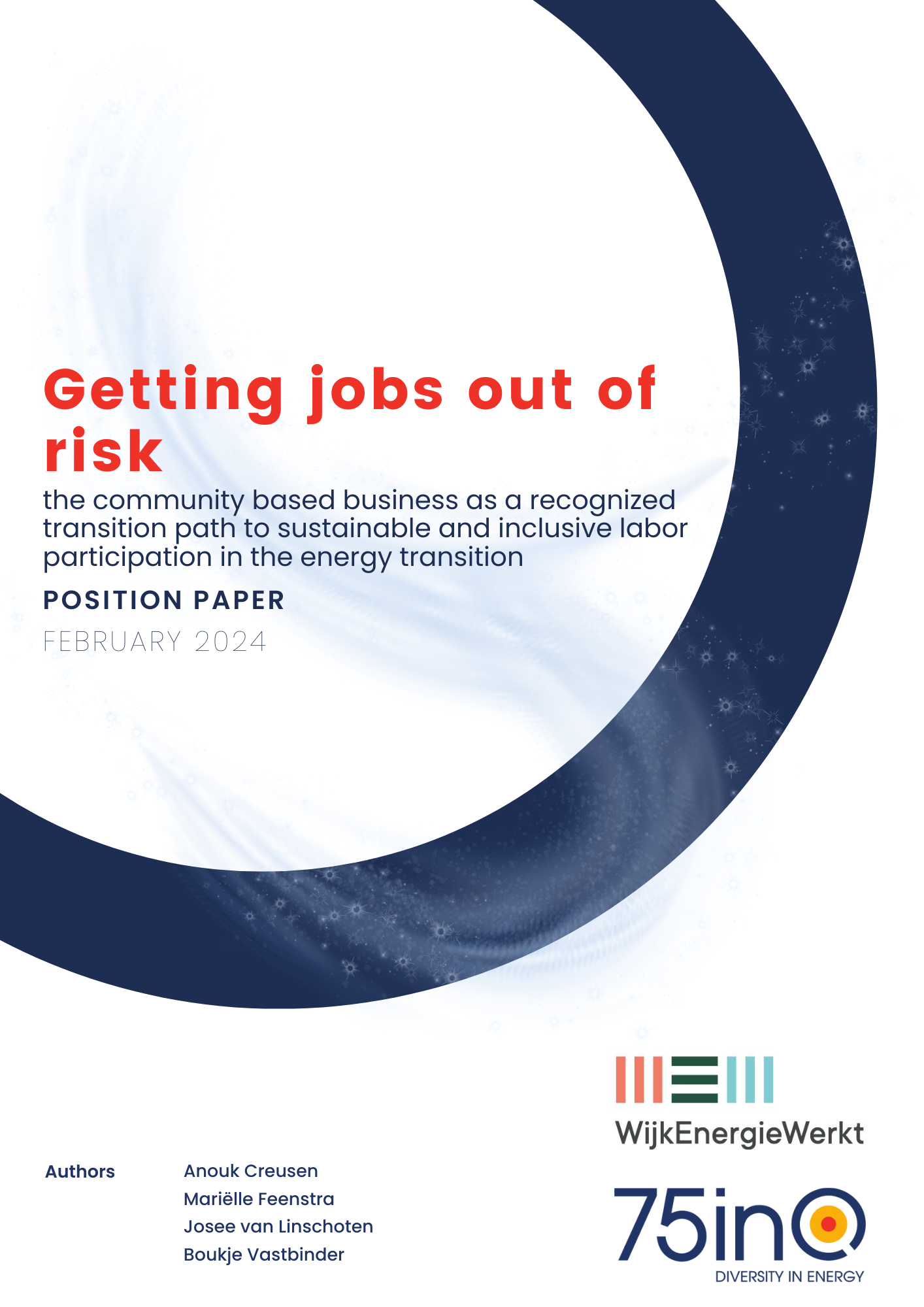GETTING JOBS OUT OF RISK
POSITION PAPER
THE COMMUNITY BASED BUSINESS AS A RECOGNIZED TRANSITION PATH TO SUSTAINABLE AND INCLUSIVE LABOR PARTICIPATION IN THE ENERGY TRANISITION
Drs. Anouk Creusen, Dr. Mariëlle Feenstra, Josee van Linschoten, Boukje Vastbinder
February 2024
Citation
Creusen, A., Feenstra, M., van Linschoten, J., Vastbinder, B. (2023) Werk uit de tocht | Position Paper Het wijkbedrijf als erkend transitiepad naar duurzame en inclusieve arbeidsparticipatie in de energietransitie

summary
Jobs in energy transition are at risk
Municipalities have a directing role in implementing the ambitions of the energy transition, such as making the built environment natural gas-free, but they lack hands and expertise in the implementation.
This labor shortage is recognized at both national and local levels and is therefore high on the political agenda. Guided by European policy frameworks such as the European Green Deal and nationally the Climate Agreement, attention is being drawn to the development of new transition paths to work in the energy transition through a range of policy interventions such as the Green and Digital Jobs Plan, the National Energy Systems Plan and by industry organizations.
In addition to the labor shortage, concern about increasing energy poverty is also widely shared and expressed. Bringing together these two points of interest in the energy transition, growing labor shortage and growing energy poverty, offers the opportunity for a successful and inclusive energy transition path.
The SER and the WRR draw clear lines towards a sustainable and inclusive labor market, serving broad prosperity.
In the neighborhood everything comes together
In addition to the substantive debate, we also see a governance discussion in the energy transition in which the various policy levels come together. A national policy is formed from European guidelines that is implemented at the municipal level.
All governance levels come together at local level. Where the people who benefit most from entry-level jobs and high-quality and sustainable work live, municipalities also face the greatest challenges in the field of making homes energy efficient and combating poverty.
Analyzing the actors at this municipal level, we see a key role for neighborhood businesses. Rooted in the neighborhood, neighborhood businesses and social enterprises can play an important role in connecting and realizing the various tasks in both the social and physical domains.
However, they are not given enough space to fulfill this key role in the energy transition task.
- When local residents can work on sustainability tasks through neighborhood companies, safely and paid, on behalf of the municipality, this opens up new transition paths that are not yet included in the national approaches.
- Due to the local character, new and underrepresented groups, such as women and people with a non-Western background, are addressed and trained within the energy transition.
To achieve this, attention needs to be paid to the combination of two fundamental elements;
- Recognition of transition path: Revaluation for entry-level jobs in the energy transition
- Good commissioning: Help for policy makers in shaping their role as commissioning party.
The ‘Energy Neighborhood Company’
The ‘Energy Neighborhood Company’ offers opportunities not only to bring together the various tasks at local level, but also to create sustainable livelihoods for energy users who are vulnerable to energy poverty.
Recommendations
The task is there, the work is there, the people are there and there is no shortage of goodwill and vision at national level.
The recommendations in this advice are aimed at connecting the transition tasks and making multiple efforts to achieve broad prosperity, with a central role for local businesses and (social) entrepreneurs.




